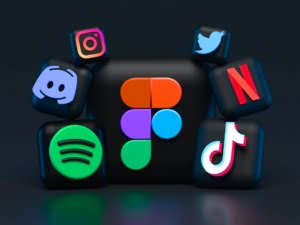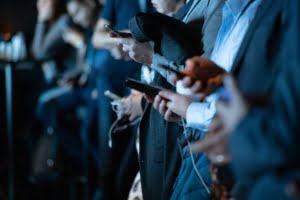With the international launch of Facebook and Instagram (IG) along with other social media platforms, the world as we knew it changed forever. Long-distance relationships became a thing of the past as couples could stay up to date with each other, sharing pictures and sending private messages. Video chatting is so common that many people prefer it over calling a friend over the telephone. But what are the long-term effects of social media?
 According to Statista, people spend as many as two and a half hours (about 135 minutes) scrolling through social media (2017 poll). These statistics are nine minutes over the 2016 figures and are expected to continue to climb.
According to Statista, people spend as many as two and a half hours (about 135 minutes) scrolling through social media (2017 poll). These statistics are nine minutes over the 2016 figures and are expected to continue to climb.
Unfortunately, not all social media is beneficial. You can keep track of your distant family, high school classmates, and acquaintances. However, you can also find yourself playing the comparison game, comparing your body, features, and life to those of other people who use filtered lenses. San Diego Christian Counseling can provide guidance on how to navigate these challenges and maintain a healthy perspective.
How do we continue to enjoy social media while not allowing the negative effects of social media to take a toll on our mental health? By raising awareness of the impact social media holds and practicing some healthier behaviors.
Negative Effects of Social Media
Can the consistent usage of social media create a behavioral disorder? Just like with any addiction, social media addiction can develop for a small percentage of users. This behavior causes the user to spend increasing amounts of time on social media platforms. They may wake up and reach for their phone first thing in the morning. Checking social media before bed or staying up for hours scrolling instead of sleeping are also common signs.
Where once the individual used to read or listen to music during their commute, the time is spent on Facebook or liking posts on Instagram. During breaks at work instead of catching up with coworkers, they might spend their time “tweeting” about their workplace on Twitter or creating pictures for Snapchat.
Social media addiction is a problem for personal relationships as well. When out to dinner at a restaurant we notice tables of people looking at their phones, taking pictures of their meal or coffee to share with others, or huddling together for a selfie to post on Facebook. But how much actual conversation are people engaging in face-to-face?
 If challenged to take a sabbatical from social media for 24 hours, could you do it? What about 48 hours or a week? The urge to check in with others is strong for those developing a dependence on social media.
If challenged to take a sabbatical from social media for 24 hours, could you do it? What about 48 hours or a week? The urge to check in with others is strong for those developing a dependence on social media.
The effects of social media on mental health is an issue as people devote more time to various platforms. Everything from feelings of anxiety and depression to worthlessness and isolation can be attributed to our fascination with keeping up with what the “Joneses” are doing in their life via IG.
Anxiety
Feeling as if you must check in on social media can create anxiety, especially if you are foregoing sleep to see what your friends and others are doing. Reading about family dramas, critical illnesses, and other disturbing news from social media can cause worry or fear. Teens may find it difficult to cut ties from social media because they worry about what their peers may say about them online or are afraid of missing something important happening outside of class.
Comparing ourselves to what we think is the “real” life of someone on social media can lead to stress as we try to live up to these new cultural standards. For example, a working mother may follow another working mother on IG who seems to be able to balance her life smoothly with no hiccups in her daily routine while the other woman is struggling with her schedule and her children’s activities. This leads to unnecessary stress and anxiety.
Depression
We often forget that people can take dozens of pictures, edit the images, and post only the very best to social media. It is easy to look around our own homes and think about how it is nowhere near as nice as someone else’s home on social media. Comparing our day-to-day routine to someone’s highlights in life can cause depression.
Most people do not post the terrible things happening around them, but they will share the new car they bought or pictures from their family vacation. This can leave users feeling as if they don’t measure up to their peers.
Children and teens with social media access may become depressed when they compare their home life to those of their peers. However, a larger problem lies in the younger generation being less emotionally engaged with real people than with their digital interactions.
Fear of Missing Out (FOMO)
 Everyone has a desire to be liked and included. Fear of Missing Out (FOMO) is a phenomenon that creates feelings of anxiety, stress, depression, and rejection when the person isn’t privy to what the rest of the world (or their peers) are involved in. It creates feelings of jealousy and, in extreme cases, a growing dislike toward the person on social media.
Everyone has a desire to be liked and included. Fear of Missing Out (FOMO) is a phenomenon that creates feelings of anxiety, stress, depression, and rejection when the person isn’t privy to what the rest of the world (or their peers) are involved in. It creates feelings of jealousy and, in extreme cases, a growing dislike toward the person on social media.
Fear of Missing Out breeds discontentment. It becomes easy to focus on what is lacking in our lives instead of being grateful for the things and people we are blessed to share it with. These thoughts can create strong feelings and aggressive behaviors towards others.
Lower Self-Esteem
Comparing your body to the edited image of an Instagram blogger is unrealistic, yet many of us do it every day. It may start out as inspiration however it can begin to chip away at our self-esteem and confidence. This can lead to eating disorders, body dysmorphic disorder, and social anxiety.
Some people look for validation through social media, translating likes and comments into acceptance. For example, they may stage a photo shoot and post a filtered image and then judge their worth by how others react to the picture. If the image or post receives little attention, they may mistakenly believe that no one cares about them. However, if their post goes viral, then they feel validated.
Shorter Attention Span
If you suspect that your mind jumps from topic to topic like a squirrel gathering nuts, you are not alone. Researchers have found that the addictive use of social media results in shorter attention spans. With the ability to access the Internet and breaking news at all hours, social media bombards us with information.
 Although connectedness is a wonderful aspect of technology, the information is too much to absorb at once. We find ourselves switching platforms or media to do something else very quickly.
Although connectedness is a wonderful aspect of technology, the information is too much to absorb at once. We find ourselves switching platforms or media to do something else very quickly.
This shorter attention span can also be seen in other areas of your life. You may find yourself reading thinner books, watching shorter films, or moving from task to task at work, unable to focus on one thing for long periods of time.
Less Time Socializing in the Real World
Social anxiety can develop if you spend too much time interacting with people more online than you do in real life. Although the people online are real humans, there is something emotionally satisfying about making a connection with another person face-to-face.
Shy children and teens are especially at risk of losing relationships. It becomes easier for them to blend into the shadows at school, only to come home and express their true selves online.
Showing you value someone by taking the time to share a meal with them and have a conversation not only fulfills a basic need for you, but it provides the other person with the knowledge that you care and that you accept them.
How to Use Technology for a Healthier Outcome
Unless you feel you have social media addiction, consider limiting your time on social media platforms. Perhaps you only check Facebook notifications and messages in the morning and specific Instagram profiles in the evening. Or, choose to only have one social media account on one platform and deactivate the others.
Turning off all of your screens at least one hour before bed can help you to fall asleep faster. The blue light that emanates from your devices can hinder your sleep cycle. Plus, you are less likely to focus on what you read on social media if you turn it off earlier in the evening.
Take breaks periodically from social media, and when you do log on, limit the time you spend mindlessly scrolling. If you plan to engage with others, then do so intentionally. Remember, you might get more out of social media if you can use it to arrange real-world meetups. San Diego Christian Counseling can help you develop strategies for more mindful social media use and encourage you to build meaningful, face-to-face connections.
“Neighbor Lady”, Courtesy of Toa Heftiba, Unsplash.com, CC0 License; “Popluar Apps”, Courtesy of Alexander Shatov, Unsplash.com, CC0 License; “Phone Users”, Courtesy of Camilo Jimenez, Unsplash.com, CC0 License; “Blanket, Book, and Coffee”, Courtesy of Sixteen Miles Out, Unsplash.com, CC0 License


